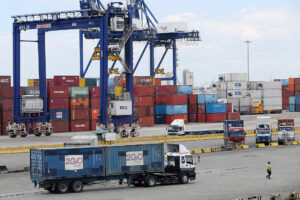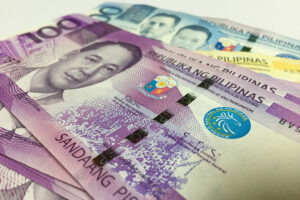
The mouth speaks, the peso sinks

It seems the peso is no longer sinking merely because of market forces but also because of what some public policy and officials say. Indeed, it is no less than the open-mouth operations of many in government that continue to drive the peso down.
The other day, every major broadsheet bannered the Philippine currency’s latest fall: “slump” (BusinessWorld), “record low” (Philippine Star, Inquirer, Manila Times), “historic low” (Manila Bulletin), and “breaches P59” (Malaya Business Insight, Business Mirror).
We doubt the peso has reached bottom. The torrent of careless commentary on the nation’s prospects reflects the deeper malaise of governance: weak leadership, muddled policy, and the erosion of public trust. Poor leadership begets poor policy; bad policy leads to weak execution and stagnant innovation throughout the bureaucracy. The repeated plunder of public funds signals a steady decline in both public spending and productive investment. And the neglect of health and education reveals a poverty not merely of resources but of foresight — a failure to prepare the next generation for political and economic leadership.
For a potential investor conducting due diligence, such signals are disheartening. Why would anyone choose to place or keep money in a country that continually undermines its own credibility?
THE BSP’S MEASURED EXPLANATIONTo its credit, the Bangko Sentral ng Pilipinas (BSP) has offered a calm and reasonable explanation for the peso’s weakness. It traced the slump to market concerns over weak economic prospects — aggravated by irregularities in flood control projects — and to expectations of sustained monetary easing.
The BSP also emphasized that it maintains ample foreign exchange (FX) reserves and allows the peso to seek its market level, intervening only to temper excessive volatility that could stoke inflationary pressures. It remains confident that “resilient OFW remittances, relatively fast economic growth, low inflation, and ongoing structural reforms” will support the peso. FX inflows from business process outsourcing (BPO), tourism, and overseas employment are cited as further buffers against external shocks.
These statements are fair. Yet they also gloss over a fundamental reality: the trade deficit remains enormous. Even when combined, BPO receipts, remittances, and tourism revenues cannot offset the shortfall. The current account deficit — a measure of our reliance on foreign savings — reached $18.3 billion last year, with another $9.2 billion shortfall in the first half of this year.
While the balance of payments (BoP) showed small surpluses in 2023 and 2024, due to substantial foreign borrowings, the first nine months of 2025 have already posted a $5.3-billion deficit. This structural gap in our external accounts lies at the core of the peso’s weakness — though not the only factor behind it.
WHEN FUNDAMENTALS FALTEREven during years of modest BoP surpluses, the peso slid steadily — averaging P55.63 in 2023 and P57.29 in 2024. Economic growth flattened around 5.5%, inflation eased to 3.2% in 2024 after hitting 6% in 2023, and fiscal deficits remained stubbornly high at P1.5 trillion in both years. Consequently, National Government debt ballooned from P14.6 trillion in 2023 to P16.1 trillion in 2024.
With a larger share of the budget devoted to debt servicing, fewer resources remain for inclusive and sustainable growth. A weak fiscal position should have compelled our leaders to act responsibly, with integrity and prudence. Instead, we have witnessed the opposite: congressional insertions, budgetary diversions, and the alleged theft of 30-40% of infrastructure funds.
Perhaps it is worth recalling that many decades ago, Filipino children studied “Good Manners and Right Conduct.” The subject’s quiet disappearance from our classrooms may have left us vulnerable to the twin culture of greed and impunity now evident in public life. Or perhaps we failed to adhere to the Scripture which was more than clear in Proverbs 22:6 that we should train a child in the way he should go; and when he is old, he will not depart from it?
THE PESO AS A MIRRORWhat, then, should we expect of the peso?
In a recent dialogue, eminent economists Maurice Obstfeld and Paul Krugman reaffirmed that exchange rates behave like asset prices — reflecting not just fundamentals but also confidence, risk, and credibility. When markets lose faith in a government’s ability to sustain growth, control inflation, and manage its finances, the currency has only one direction to go: down. Capital flight and investment hesitation follow swiftly.
The peso, in this light, is not merely a unit of exchange but a mirror of our national condition. It measures not only our trade position or fiscal balance but also our political will and institutional coherence.
GLOBAL HEADWINDSExternal pressures add to the strain. The full effects of recent US tariff hikes have yet to be felt, while new trade tensions and protectionist moves cloud the global outlook. The International Monetary Fund itself warns that such developments could dampen investment and sentiment more than expected, tightening financial conditions worldwide and amplifying existing vulnerabilities.
For the Philippines, this means both monetary and fiscal policy must tread carefully. We cannot respond to slower growth with unrestrained easing; we must conserve credibility for when genuine shocks strike.
THE US FACTORFormer US Treasury Secretary Larry Summers warned earlier this year that the US dollar faces risks such as volatile policy shifts under Trump, the politicization of the Federal Reserve, and potential erosion of global confidence. Yet even he concedes that the dollar’s dominance remains intact, given doubts over the Chinese renminbi’s viability and America’s enduring strategic influence.
This implies continued strength of the US economy and currency which, in turn, pressures the peso. Should the BSP persist with an easing bias, or even hint at it, market unease may deepen. The peso’s breach of P59 could be only the first hurdle in a longer slide.
To arrest further decline, should the BSP need to send a decisive signal? One as strong as Mario Draghi’s now-legendary 2012 declaration: “Within our mandate, the European Central Bank is ready to do whatever it takes to preserve the euro. And believe me, it will be enough.” Or simply allow market forces to collect tuition fees from those who take inappropriate positions in the foreign exchange market?
DEFENDING CONFIDENCESummers has also noted that inflation risks in the US remain real, and that Federal Reserve Chair Jerome Powell’s cautious stance, marked by flexibility and humility, is justified. Even after the recent rate cuts, a resurgence of inflation could push the Fed to tighten again. A firm Fed and a strong dollar will keep emerging-market currencies, including the peso, under pressure.
But our vulnerability is not inevitable. What weakens the peso most is not the strength of the dollar but the fragility of our institutions and the noise emanating from the incoherence of public policy and unscrupulous officialdom. When those in power speak without discipline, dismiss accountability, or trivialize corruption, they invite skepticism from investors and citizens alike.
Markets, like people, can tell the difference between serious leadership and mere performance. The more talk diverges from action, the deeper the credibility gap and the lower the peso sinks.
FINAL WORDThe peso’s decline is thus both a financial and moral story. It reflects not only deficits in our trade and fiscal accounts but also deficits of trust, competence, and integrity in governance.
Every careless statement from a public official reverberates through markets already strained by weak fundamentals. Every scandal left unpunished deepens the perception that reform is impossible.
Until our leaders learn to match words with deeds, the peso will continue to suffer the consequences of their rhetoric. For as long as the mouth keeps speaking but the hand refuses to act, the peso will keep sinking, not merely against the dollar, but against the weight of our own failures.
Diwa C. Guinigundo is the former deputy governor for the Monetary and Economics Sector, the Bangko Sentral ng Pilipinas (BSP). He served the BSP for 41 years. In 2001-2003, he was alternate executive director at the International Monetary Fund in Washington, DC. He is the senior pastor of the Fullness of Christ International Ministries in Mandaluyong.



